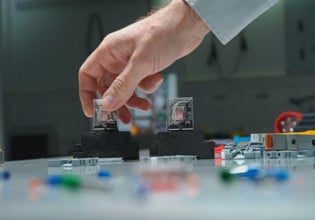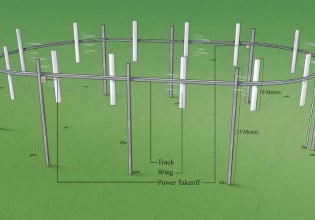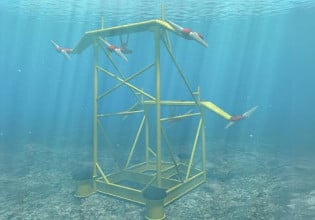Eight power electronics and energy-related companies were included in the recently-published annual “50 Disruptive Companies†article in the MIT Technology Review. Those companies include (in alphabetical order): ABB, Alta Devices, Ambri, Aquion Energy, BrightSource Energy, Dow Chemical, General Electric, and Philips. Only two of these companies (Alta Devices and General Electric) were on last year’s list. The following is a brief overview of how each of these companies came to be included in the list of “50 Disruptive Companies 2013.â€
ABB is on the list in recognition of, “Perfecting a circuit breaker for high-voltage DC lines—a crucial step for widespread use of renewable energy.†DC lines have long been used to transmit power across the North Sea, and from large hydroelectric dams to cities. But until ABB’s advance, it wasn’t safe to connect DC lines into a large-scale grid. ABB’s circuit breaker changes that. Within five milliseconds it can stop the flow of a huge amount of power—equal to the entire output of a nuclear power plant. The breakers could be used to nearly instantaneously reroute power in a DC grid around a problem, allowing the grid to keep functioning. “Ordinarily, if something goes wrong anywhere, all the power goes off,†said Claes Rytoft, ABB’s chief technology officer. “The breaker can cut out the faulty line and keep the rest healthy.â€
Alta Devices, BrightSource and Dow were all recognized for achievements in various areas related to photovoltaics. Alta Devices achievements included: “Advancing ultra-efficient solar. The military will use Alta's flexible sheets to provide portable power to drones and soldiers.†BrightSource “Opened the biggest solar plant where mirrors reflect light onto a tower to generate steam.†And Dow made significant progress in “Commercializing roof shingles that incorporate photovoltaic materials and thus double as cheaply installed solar panels.â€
Advances in utility-scale energy storage put Ambri and Aquion Energy on this year’s list of 50 Disruptive Companies. Ambri is developing “a battery for storing energy on power grids. Its molten electrodes quickly absorb large amounts of electricity.†While Aquion Energy is “Beginning to sell a novel kind of battery that it can manufacture cheaply; utilities could use it for grid storage.†The site for Aquion’s factory is a sprawling former Sony television factory near Pittsburgh. The initial production capacity will be “hundreds†of megawatt-hours of batteries per year. The batteries are based on inexpensive materials, sodium and manganese, and use a water-based electrolyte that’s claimed to be safer and cheaper than the organic ones used in lithium-ion batteries.
General Electric’s listing is in recognition of “Helping utilities make use of wind and solar.†And the development of: “a new GE gas turbine ramps up quickly when greener power isn't available. The last company in the alphabetical listing, Philips “Makes efficient LED light bulbs affordable and more useful. One new bulb can be controlled by phones and tablets.†Philips’ ‘hue’ is touted as the “world’s smartest LED bulb." According to Philips, the hue can be setup in minutes using a tablet computer. The intuitive app allows remote control of home lighting to help secure the home, personalize home lighting experience with custom settings and program timers to help manage daily schedules, all through the convenience of a smart device. An intuitive and seamless system, Philips hue is upgradeable and future-proof, with the potential for more features to be downloaded and enjoyed in the future. With its high quality energy-saving LED light, Philips hue allows users to tune shades of white light or create any color.






